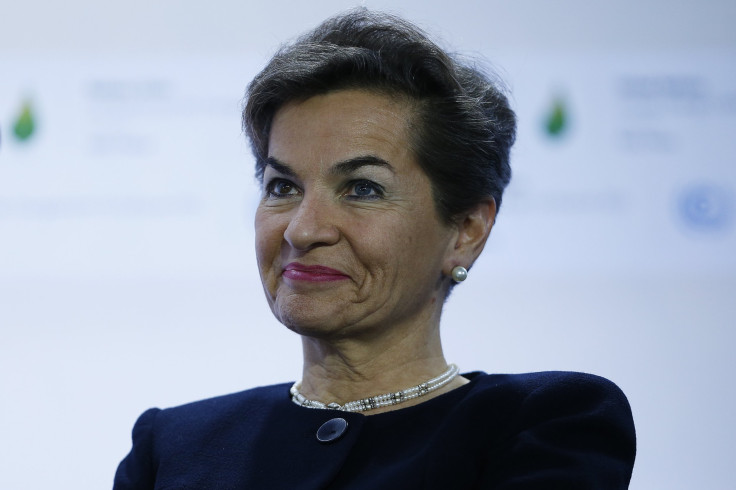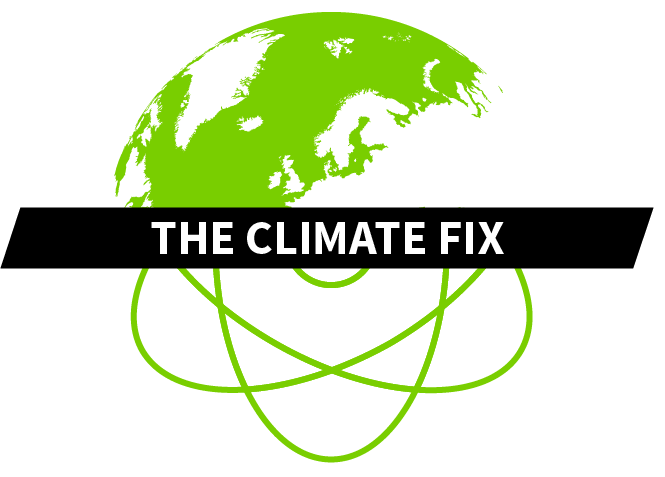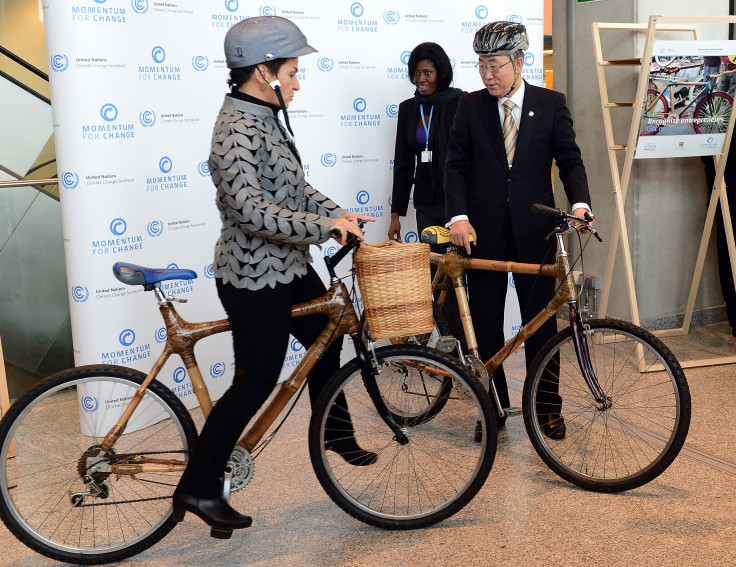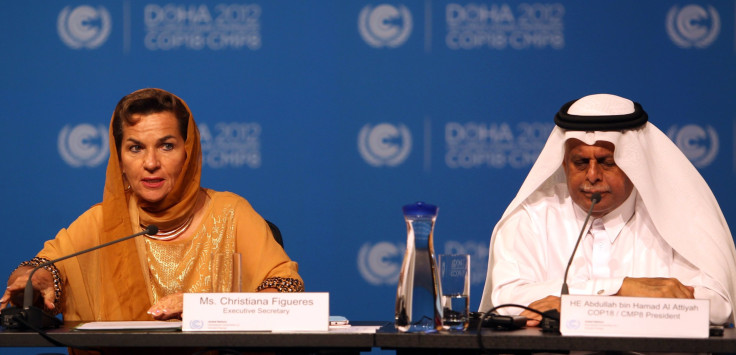Paris Climate Change Talks 2015: Christiana Figueres, UN Climate Chief, Reaches Pivotal Moment In Five-Year Journey


Christiana Figueres’ mandate is no small task: Persuade world leaders to make drastic cuts in their greenhouse gas emissions and avoid catastrophic global warming. Figueres, the United Nations climate chief, plays a pivotal role in bringing diplomats, business executives and community groups to the negotiating table -- all with the aim of reaching a global agreement to fight climate change.
As the ongoing U.N. climate talks in Paris near a Friday deadline, Figueres, 59, is facing one of the most critical moments in her career.
Figueres brings to her position a firecracker personality, one that stands in stark contrast to the drab conference rooms and stuffy political language that define many of her frequent meetings. At 5 feet tall, with closely cropped hair and dressed in brightly colored blazers, she speaks with a tireless energy and animated hands, and she’s prone to well up with tears as she describes the threat that climate change poses to humanity.
To distant observers, the key players in the high-stakes negotiations may seem to be the leaders of large, heavy polluting nations, such as the United States, China and India. But for the past five years, Figueres has served as the glue for the entire process, meeting with leaders from nearly 200 nations -- including the wealthiest and poorest, the safest and most politically unstable -- to convince them of the need to transition away from fossil fuels.
She’s managed to inject an air of optimism and momentum into an effort that’s dragged on for more than two decades, her peers say.
“Christiana Figueres is a fixture of inspiration for all of us,” Jennifer Morgan, an expert on international climate negotiations with the World Resources Institute, said by phone from Le Bourget, the northeastern suburb of Paris where the two-week talks are being held. “Her role is really one of trying to engage everyone … and inspire them to do more, and to at the same time come to terms with the hard-nosed scientific approach of what climate change really means.”
Figueres, a Costa Rican diplomat who lives and works in Bonn, Germany, is the executive secretary of the U.N. Framework Convention on Climate Change. Under the framework, signed by 195 countries, participants have agreed to hold an annual meeting, known as the Conference of the Parties (COP), to discuss a deal that would prevent global temperatures from rising to dangerous levels and sparking widespread sea level rise, devastating droughts, violent storms and vanishing harvests.
When Figueres took the position in 2010, she entered the role at a fragile time in the negotiating process. The year before, at the 15th COP in Copenhagen, negotiators had expected to reach a historic, legally binding agreement on emissions. Instead, the talks ended in anger and a pervasive feeling of futility: Could 195 countries ever agree on a universal treaty? And if they could, would the accord be too watered down to make a real dent in global warming pollution?
In the years since, Figueres has worked virtually nonstop to dispel both concerns. She’s convened countless meetings around the globe to drum up support for a strong climate deal from foreign ministers, influential billionaires like Bill Gates and Richard Branson, major banks such as Citigroup, as well as religious leaders like Pope Francis, whose highly anticipated encyclical this year urged the world’s Catholics to climate action.

Figueres was born into the world of global politics. Her father, José Figueres Ferrer, led the Costa Rican revolution of 1948 and served as president of the country three times. During his first term in office, he abolished Costa Rica’s army and adopted sweeping political and social reforms. Christiana’s brother, Jose Maria, was president from 1994 to 1998. Her mother, Karen Olsen Beck, served as the Costa Rican ambassador to Israel in 1982 and as a Costa Rican legislator in the early 1990s.
Growing up in Costa Rica, Figueres learned to speak fluent German at the Humboldt School in San José. She studied anthropology at Swarthmore College in Pennsylvania, and later earned a master’s degree from the London School of Economics. She also spent a year living with the Bribri, a remote indigenous group that lives in Costa Rica’s Talamanca Mountains.
“I have no problem sitting on the floor, sipping hot water from a dirty cup,” she told the New Yorker magazine in an August profile. “I also have no problem sitting next to Prince Charles.”
But Figueres said her deep interest in environmental issues didn’t fully develop until after her two daughters, Naima and Yihana, were born in the late 1980s. She realized they would never see the golden toad in Costa Rica, a tiny amphibian that Figueres saw as a child but has been considered extinct since 1989.
“I was actually turning over what I’d call a diminished planet to my daughters,” she recently told the Financial Times. “It is quite a deep, personal experience when you see a species disappear.”
Driven by that impulse, she joined the global climate fray in 1995, first as a negotiator for the Costa Rican government. She played a key role in the negotiations that led to the 1997 Kyoto Protocol -- the first international agreement to reduce greenhouse gas emissions. The treaty expired three years ago with little discernible impact, however, due to the lack of participation from major polluting countries. The United States signed the treaty but never ratified it, while China, India and more than 100 other developing countries were exempted from the targets.
In her job as U.N. climate chief, Figueres at times must strike a delicate balance between pressing for the end of fossil fuels while sympathizing with fossil-dependent economies like Saudi Arabia. When meeting with the Saudis, she said she avoids the term “low carbon” -- which refers directly to emissions from burning oil, natural gas and coal -- and instead uses the more generic term “low emissions,” which includes other greenhouse gases, such as nitrous oxide and hydrofluorocarbons, she told the New Yorker. “They don’t like the term ‘decarbonization,’ because for them that points the finger directly at them,” she said.

She’s taken a similar tack in pressuring her employer, the United Nations, to accelerate its own efforts to fight climate change. At a Sept. 22 press event at the U.N. headquarters in New York City, she goaded colleague Janos Pasztor, the U.N.’s assistant secretary-general on climate change. Pasztor announced that every agency in the U.N. would strive to become carbon neutral within five years, meaning the agencies would “offset” all of their carbon dioxide emissions by investing in clean energy projects or reforestation. Figueres pushed back against that five-year timeline. She said she’d already purchased enough carbon credits to offset her own lifetime emissions, as well as the full carbon footprints of her adult daughters. That’s on top of Figueres driving a 9-year-old Prius and taking the public tram most days to her office in Bonn. She became a vegetarian two years ago because of the high carbon output associated with producing meat.
"To me it's no longer acceptable to say the U.N. is going to be carbon neutral by 2020,” Figueres said to Pasztor. “This is the year in which we truly have to walk the talk. We have to up the ante.”
Figueres’ efforts are culminating this month with the COP21 summit in Paris. Now in their second week of talks, foreign ministers are just beginning to wade through the sticky issues that in past years have weighed down negotiations, including the level of financing wealthy nations should extend to help poorer countries adapt to the punishing effects of global warming, said Morgan, the World Resources Institute expert.
On Monday, a group of countries, including the United States, signaled support for incorporating an ambitious 1.5 degree Celsius warming limit into the final agreement. The new target is a major shift from the existing international goal of 2 degrees Celsius -- and may prove to be another contentious speed bump for negotiations.
Figueres, for her part, shared an optimistic message from her Twitter account Monday.
“It is frankly a privilege for all of us who are alive right now to witness the astonishing transformation that we are going through,” she said in a video clip. “And here at COP21 we are helping to write history as we move from an unsustainable past into finally a sustainable future.”
© Copyright IBTimes 2024. All rights reserved.





















